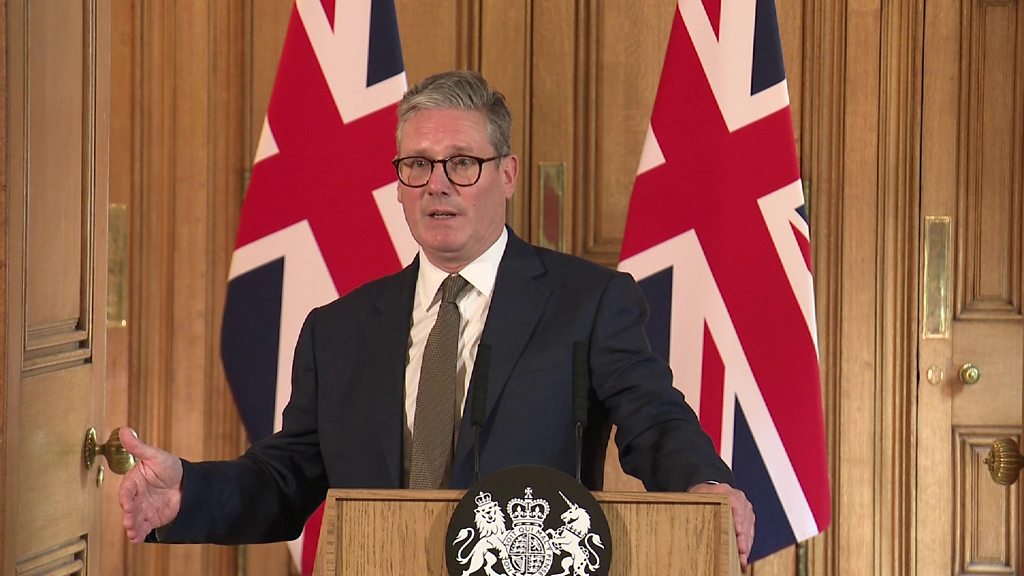We have too many prisoners, says new PM Starmer
Sir Keir Starmer has expressed a commitment to reducing prison populations by focusing on reducing reoffending rates. During his inaugural press conference as prime minister, he highlighted concerns about the high rate of recidivism, stating that too many individuals return to prison shortly after release. Addressing youth involvement in knife crime was identified as an early priority for his administration. Despite acknowledging the challenge of prison overcrowding, he emphasized that there is no quick fix, noting the imbalance between the number of prisoners and available facilities.
In a move reflecting his approach, Sir Keir appointed businessman James Timpson, known for advocating that only a third of prisoners belong behind bars, as his prisons minister. Timpson, CEO of a shoe repair chain that actively hires ex-offenders, has criticized society’s punitive mindset, describing it as “addicted to punishment.”
Following a decisive election victory, Labour has pledged to review sentencing policies, inheriting a crisis of overcrowded prisons from the previous Conservative government. They have committed to continuing the early release scheme initiated by their predecessors to alleviate immediate pressures on prison capacity.
However, concerns about prison capacity persist, with the Prison Governors’ Association warning that jails are on the brink of running out of space. Former Conservative Justice Secretary Alex Chalk, who lost his seat in the recent election, had previously advocated for early prisoner releases, citing record-high prison populations and the necessity to optimize prison use. Despite these measures, he emphasized the importance of maintaining adequate prison places for the most dangerous offenders to ensure public safety.
Details of Labour’s review are yet to be unveiled, but Mr Timpson’s appointment has offered an early signal that a change of approach may be on the cards in this area.
Sir Keir has appointed him a member of the House of Lords, allowing him to take up a post as prisons minister at the Ministry of Justice.
The businessman told a Channel 4 podcast in February that prison was a “disaster” for around a third of prisoners, and another third “probably shouldn’t be there”.
He said too many people being in prison for “far too long” was an example of “evidence being ignored because there is this sentiment around punish and punish”.
“We’re addicted to sentencing, we’re addicted to punishment,” he added.
Asked about his comments at a Downing Street press conference, Sir Keir did not offer a view on whether he agreed with those estimates.
But he added: “We do need to be clear about how we use prisons.
“For so many people [who] come out of prison, they’re back in prison relatively quickly afterward.
“That is a massive problem that we have in this country, that we do need to break.”
He said his party wanted to cut knife crime in particular, and cited his plan to set up a network of “youth hubs”.
Sir Keir, a former lawyer, added: “I’ve sat in the back of I don’t know how many criminal courts and watched people processed through the system on an escalator to go into prison.
“I’ve often reflected that many of them could have been taken out of that system earlier if they’d had supported”.
Labour says it wants to create 20,000 prison places by enabling ministers to override local councils on planning decisions.
But it also plans to keep in place the scheme implemented by the last government under which some lower-level offenders can be released up to 70 days early.
Sir Keir said Conservative ministers had created a “mess” by failing to build enough prisons and mismanaging the prison budget.
Defending his decision to keep the early-release scheme in place, he added: “We don’t have the prisons we need, and I can’t build a prison within 24 hours.”
The latest official figures, published on Friday, put the prison population of England and Wales at 87,453 out of a “useable operational capacity” of 88,864.
The SNP-run Scottish government, responsible for prisons in Scotland, plans to release between 500 and 550 inmates in the coming months.


